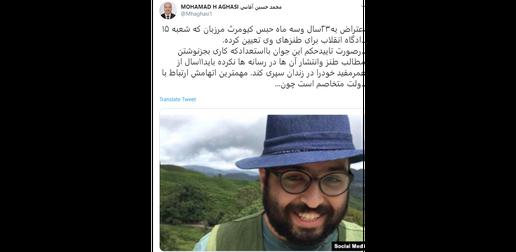A Revolutionary Court has sentenced Keyomars Marzban, a writer and satirist who has been in detention since September 2018, to 23 years and nine months in prison. According to Article 134 of the Islamic Penal Code, he must serve at least 11 years of his sentence. The court also banned him from traveling abroad, publishing his writing and using social networking sites for two years.
“My client is not guilty, and he had no malicious intentions in the writings that led to this heavy sentence,” Marzban’s lawyer, Mohammad Hossein Aghasi, told IranWire. “The longest portion of the sentence, 11 years, is related to the charge that my client has connections to hostile governments, meaning the United States. He was also charged with conspiring against national security although the court acquitted him of this charge.”
Aghasi noted that Marzban has never traveled to the United States, nor has he had any work-related connections to the US.
The 28-year-old satirist was also sentenced to seven years and six months in prison for “insulting the sacred”, i.e. insulting Islam, three years for insulting Supreme Leader Ayatollah Ali Khamenei, one and a half years for spreading propaganda against the government and nine months for insulting Iran’s authorities.
Aghasi added that the sentences handed down against Marzban actually went beyond the maximum limit for the crimes of which he was accused.
Marzban had first left Iran in 2009, living in Malaysia and Georgia, before returning to Iran in the summer of 2017 to see his ailing grandmother. His arrival in Iran was uneventful. But within a year Branch 1 of the Evin Prosecutor’s Office opened a case against him and he was arrested on August 26, 2018. Agents of the Revolutionary Guards Intelligence Organization arrested him at his home, confiscating personal items, including his mobile phone and his laptop.
On September 12, a website affiliated with the Revolutionary Guards, Edalat Khahan (“Seekers of Justice”), claimed that Marzban had traveled to the US with the intention of launching an anti-Iranian media outlet “aimed at inflaming the people and creating social divisions.”
Edalat Khahan also accused Marzban of working with Freedom House, a human rights organization based in Washington, DC, to attract Iranian artists and celebrities to opposition causes.
Never Been to the US
A source close to Marzban, however, told [Persian link] the Center for Human Rights in Iran (CHRI) that Marzban has never visited the United States. “After leaving Iran in 2009, he lived in Malaysia for some years and in the Republic of Georgia for a few months,” said the source. “Outside of Iran, Keyomars has only been to Malaysia and Georgia.”
“Kioomars loves to write, and although he’s very young, he has matured a lot in recent years,” one of his friends told CHRI. “He has no political sympathies toward any individual or political group and his main passion is writing and being involved in literary activities. We are shocked he has been arrested.”
According to Aghasi, the trial of Kioomars Marzban was conducted in two sessions at Branch 15 of the Revolutionary Court, the first on March 4 of this year and the second in July. “I was informed of the verdict 20 days ago,” he said.
What evidence did the prosecutor bring against Marzban? “He is a satirist and writes satire. He used to write for the media outside of Iran and that was the evidence used to convict him,” Aghasi said. “Marzban says he had no malicious intent and I believe the same. I believe that he is not guilty and now we have to wait for the appeals court.”
But there is a catch. According to a decree by Ebrahim Raeesi, Chief Justice of Iran since March, judges of the courts of appeal can decide to issue their verdicts without the presence of the accused and his lawyers at the trial. This has already happened in some cases. The judge of Branch 36 of the Revolutionary Court of Appeals issued verdicts in cases against two political prisoners — the student Aras Amiri and the journalist Hamed Aynehvand — without giving them or their lawyers a chance to defend themselves at a trial. This means that political and security defendants, who often receive heavy sentences, can no longer be certain of mounting their own defense in an appeals court.
Aghasi is still hopeful. “I hope the trial would be held with our presence so that we can present our defense at length,” he said. The appeals court “might encounter ambiguities in the case that the lawyer can easily clarify for the court, if he is present at the trial, and can defend his client as best as possible. Now we are waiting for the court of appeals.”
Aghasi added that Marzban – who has been in detention for nearly a year – suffers from no physical problems though the verdict has intensely worried him and his family. “Kioomars does not belong in prison,” Aghasi said.
visit the accountability section
In this section of Iran Wire, you can contact the officials and launch your campaign for various problems

























comments